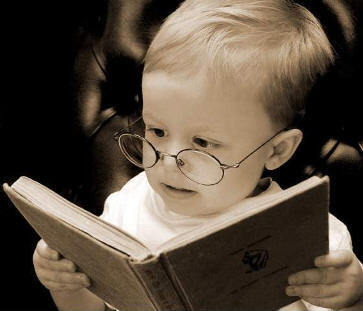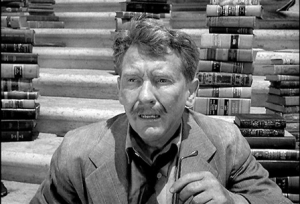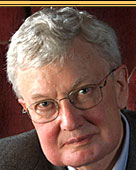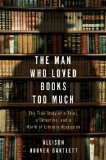Ruminations on Readers: Bibliophiles, Bibliomaniacs and You
A truly good book teaches me better than to read it. I must soon lay it down, and commence living on its hint. What I began by reading, I must finish by acting.
~ Henry David Thoreau
George Carlin famously asked “Have you ever noticed that anyone driving slower than you is an idiot, and anyone driving faster than you is a maniac?” Carlin’s own little theory of relativity has been on my mind this past week, not because of the disparate personalities on the road, but because of the divergent personalities of the book people.

There are all sorts of “book people” out there, and as a professional organizer and student of life, I’ve seen examples of many. I’m still awed by a decades-ago visit to Mark Twain’s house in Hartford, and particularly his floor-to-ceiling library. Not yet an organizer, I nonetheless found the idea of a room entirely dedicated to reading, with adequate shelving to (safely) hold a growing collection, sliding ladders, cozy lighting and comfortable seating to be an ideal. Every book had a home and could be accessed easily, and in both Twain’s time and my own, a staff was available to keep the books free from dust, grime, mold and any other dangers to literature, history and knowledge. One quick tour around the library made me feel that I knew the man, or at least knew the value he placed on reading, which is sometimes almost the same.
But I’ve also worked with clients so deeply tied to the idea of possessing certain books (as opposed to reading them) that nothing in my professional organizer’s arsenal could dissuade them. Some clients point vaguely to humidity-wilted, tilting towers of cobwebby, nibbled cardboard boxes, assuring me that all the books within them are essential and can never be purged. That they may not have been touched, let alone read or cared for, in decades, is a subject some are unwilling to entertain.
There have been numerous others who refused to “set free” books that were so water-stained and covered with mold that it was hard to make out the text, or who thought an adequate compromise involved taking a scissors to the margins of the books to cut away the “worst” of the mold, as if inhaling slightly fewer spores might be satisfactory. We are not talking about first editions; some of these books were acquired as bargain books and could easily have been repurchased for less than the cost of a cappuccino.

And recall the classic Twilight Zone episode Time Enough At Last, in which Burgess Meredith delivers his tortured portrayal of Henry Bemis, the last man on Earth, who finally has a lifetime to read and an almost endless supply of books…who accidentally breaks his glasses. No bibliophile can watch that and not feel anguish.
Book people feel fiercely about their books.

Film critic Roger Ebert’s blog post last week really struck a chord with readers, including Paper Doll. Reader comments are still growing a week after the post appeared, and his fascinating Books Do Furnish a Life post is gripping reading. Indeed, before we turn a metaphorical page, please go read his post…and even a smattering of the hundreds and hundreds of passionate reader comments…and then come back here. It’s OK, I’ll wait patiently. (I’ve got some books I can read in the meantime.)
Ebert is, at times, a great writer. He is also a great reader, and is not unaware of the complexities and difficulties his passion for books can cause. (Perhaps ironically, given the context of collecting vs. hoarding or even over-collecting of books, it’s on-point to note that Ebert’s post title is a riff on Anthony Powell’s Books Do Furnish a Room, the tenth in a twelve (!) book novel series, A Dance to the Music of Time.)
The professional organizer in Paper Doll battled her own inner bibliophile in reading Ebert’s post. Certainly, I could imagine discouraging him from keeping the inkless pens in the broken mug or the Tandy 100, capable of holding no more than 100 KB of data! And I would discourage the keeping of second (and third and fourth) copies of books (except for “reading” duplicates of valuable first editions, which one would wish to keep pristine).
However, as much as I love my career as a professional organizer and strive to help my clients trade chaos and dysfunction for serenity and a functional household or workspace, I understand the distress one faces when having to let go of books just because there is not adequate space for storage. (Of course, space is always the material issue. When one has sufficient space to store books, there is never any discussion of whether there will be sufficient time to ever read them.) It takes vigilance to keep the books from outpacing the space set aside for them, and it takes forbearance to purge the books that you love not for the writing, but for the memories associated with them.
There is the logical…and then there is the book lover.
Ebert’s post was only one inspiration for today’s Paper Doll ruminations. A few days earlier, I heard a fascinating Bob Edwards Weekend radio interview (click for the podcast) with journalist Allison Hoover-Bartlett, author of The Man Who Loved Books Too Much: The True Story of a Thief, a Detective and a World of Literary Obsession.

Hoover-Barlett’s book investigates the seamier side of rare book collecting, including an in-depth profile of John Charles Gilkey, who posed as a book dealer but who was, in fact, a thief who stole from rare book dealers and collectors.
The author’s depiction of how “book detectives” and the literary community came together to catch Gilkey sounds almost like a spy thriller. That the brazen thief Gilkey responded to Hoover-Bartlett’s inquiry as to whether he’d ever taken a book from a library with an appalled “No! That would be stealing!” just adds another bit of anecdotal evidence that books can make us a little…kooky…and no book lover is entirely immune.
Of course, an occasionally overzealous affection for books that might surpass available storage space does not necessarily eliminate one from the ranks of advisors. In the past two years, I’ve been confident in the advice I’ve imparted on personal libraries, from the practical, including:
Book ’em, Danno! Organizing Your Beloved Books
Shhhhh….We’re Organizing the Library
to the goofy:
No Fooling–Fabulous, if Not Functional, Ways To Organize Your Books
Be a Fool (for Organizing Your Books) Extravaganza
The continuum on which book-collectors, book-lovers and book-hoarders exist is hard to dissect or analyze; there are those who can sell or donate books they were given but not those they selected themselves (or vice versa), those who can let go of recent acquisitions but not those they’ve possessed for decades (even if they’ve never read them) and there are those who steadfastly hold on to every book because of a sense of the literary version of potential energy each title seemingly possesses.
Certainly, at the deep (and scary) end of the spectrum, there’s book hoarding, and though Paper Doll does not specialize in hoarding, I can share with you some behavioral and philosophical differences between collecting and hoarding.
- Collectors experience a sense of pride in ownership; that pride is evinced by creating a system for displaying the possessions in the collection. (Mark Twain and those who maintain his library come immediately to mind.) The system need not be “perfect”, but it enables bibliophiles to share their love of their possessions with others by showing off what they’ve collected…in some manner. As I often tell clients, “Don’t put things down; put them away.” Away is a concept which requires that any item in a collection has a home, where it belongs, and where it can be lovingly displayed. It is a heartbreaking truth for book-lovers to accept that there is a limit to how many books they can own. Professional organizers can help with creative solutions, but if you live in a phone booth, you just can’t keep your grand piano.
- Bibliomaniacs, or book hoarders, will likely have no system; instead, vertical, horizontal and upside-down piles of books, arranged without thought of author, category or inherent value, will appear on every flat surface. In extreme cases, bathtubs, beds and ovens will serve as storage. Book hoarders may speak of their “collections” lovingly, but the lack of loving treatment of, or organizing system for, the items may be reflected by embarrassment (an unwillingness to show or share the so-called collection) and an inability to find (or even actually know) what is owned, leading to repeated purchases of the same titles.
Not everyone has a passion for books. In NPR book critic Maureen Corrigan’s book Leave Me Alone, I’m Reading: Finding and Losing Myself in Books, she recalls Mr. (Josiah) Bounderby of Charles Dickens’ Hard Times, who sees books only as commodities. Corrigan says of these “Bounderbys” in modern life, “Books just don’t register with this crowd. They think I lack common sense; I think they lack a part of their souls.”
Nonetheless, I think many more of us than one might assume harbor a belief in the power of books. As Elie Wiesel said, “I feel that books, just like people, have a destiny. Some invite sorry, others joy, others both.”
Unlike most of my posts, this one does not seek to provide how-to instructions. (For that, read or reread the older posts linked, above.) Instead, this is a reflection on what books mean to us each, individually, and how our treatment of our personal libraries may reflect more about us than the titles within them. I’d love to hear what Paper Doll readers have to say about books–as their passions and their possessions–and how they are able (or not) to balance the lack of space to house them and time to read them with the yearning to possess the knowledge or concepts within.
- Are there books you are simply unable to set free, even though you know in your heart you will never read them again (or even once)?
- Do you own books on subjects that hold no appeal for you?
- Do you buy/acquire books even when your To Read pile has become a To Read room?
- Is it enough for you to just read a book without owning it? Or can/do you take advantage of your public library, BookMooch
 or PaperBackSwap
or PaperBackSwap  to read some books without adding them to your permanent collection?
to read some books without adding them to your permanent collection? - What would “enough” books look like to you?
Finally, one last book quote upon which we can ruminate, on a crisp autumn day:
The buying of more books than one can possibly read is the soul’s way of trying to achieve infinity.
~Author Unknown (Seen on a poster in a San Francisco bookstore)




Follow Me